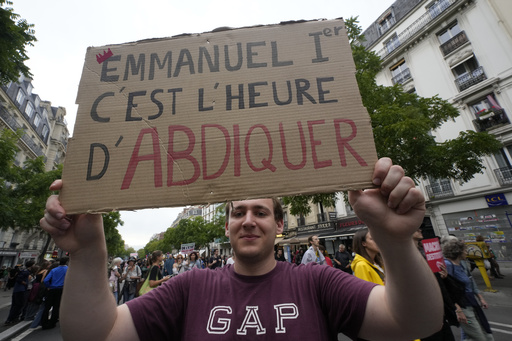Thousands of demonstrators marched in various cities across France following a call from a far-left party leader who criticized the president’s appointment of a conservative new prime minister, Michel Barnier, as a “power grab.” The protests challenged President Emmanuel Macron’s decision to bypass a prime minister from the far-left bloc after a divisive legislative election result in July. While the turnout nationwide was not reported to be massive, the left, particularly the France Unbowed party, expressed discontent over Barnier’s conservative background, viewing it as going against the will of the electorate and exacerbating the already tense political atmosphere in the EU’s second-largest economy.
Protesters gathered in Paris at Place de la Bastille, carrying signs questioning the democratic process. The leader of France Unbowed, Jean-Luc Melenchon, delivered a passionate speech during the Parisian demonstration, stating that “the French people are in rebellion” and calling for a sustained battle against the government’s actions.
Rallies were held in about 150 locations nationwide, with tensions high in Paris as protestors voiced their concerns over Barnier’s appointment. As Barnier met with healthcare workers at Necker Hospital in Paris for his first official visit as prime minister, critics emphasized that the public unrest could shape the future of his government.
Barnier, who is in the process of forming his Cabinet, expressed a commitment to addressing public concerns, particularly regarding France’s public services. The far-right National Rally (RN) leader, Jordan Bardella, warned that his party was monitoring Barnier closely and called for the prime minister to address their priorities, including national security and immigration, in his agenda.
Barnier, at 73, is the oldest prime minister in the modern history of France’s Fifth Republic, replacing Gabriel Attal, the youngest prime minister who resigned eight months into his term after Macron’s centrist government fared poorly in the snap legislative elections in July. Attal was also France’s first openly gay prime minister, while Barnier’s previous voting record on decriminalizing homosexuality in 1981 has drawn criticism.
Barnier’s appointment comes at a challenging time as he attempts to form a government that can navigate a fractured National Assembly with deep divisions between the far left, far right, and Macron’s weakened centrist bloc. Macron’s decision to choose Barnier, a seasoned political figure with strong ties to the EU, is seen as an effort to bring stability to French politics amidst ongoing turmoil.
Despite Barnier’s extensive political experience, the path ahead remains uncertain as he faces the daunting task of uniting a polarized political landscape. Macron, who initially promised a departure from traditional politics, now grapples with the very instability he vowed to overcome, as his administration and the country remain in a state of uncertainty.
